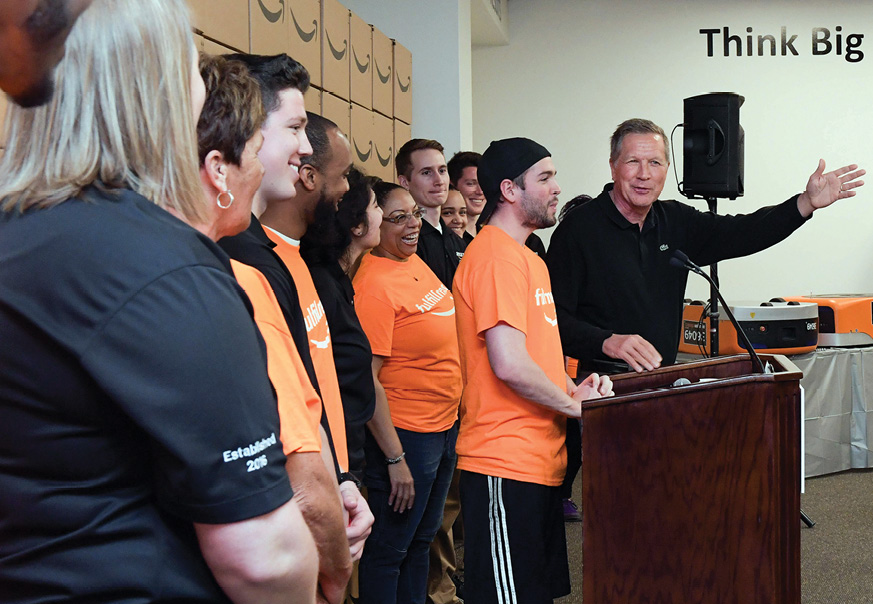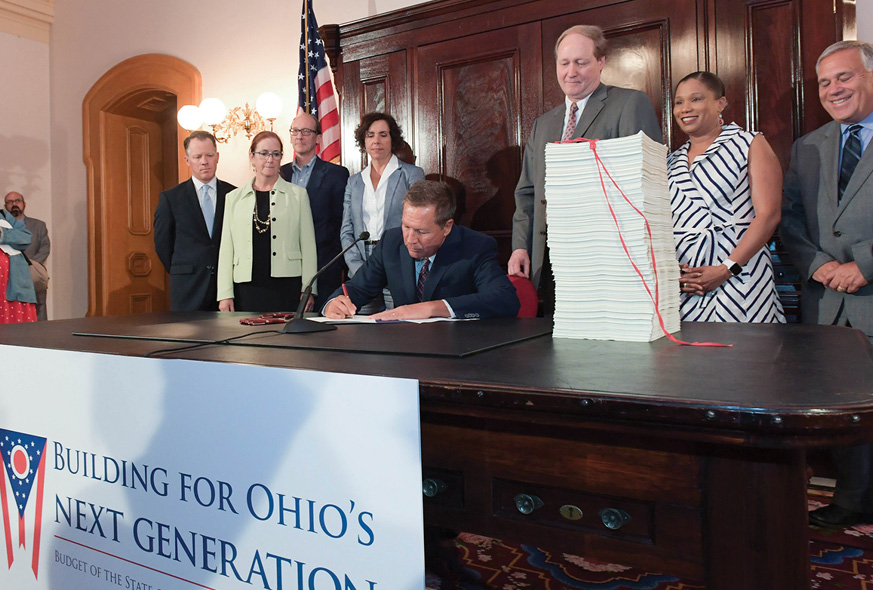- Home
- Media Kit
- Current Issue
- Past Issues
- Ad Specs-Submission
- Ad Print Settings
- Reprints (PDF)
- Photo Specifications (PDF)
- Contact Us


![]()
ONLINE

Investing
in the Future
Editors’ Note
John Kasich was sworn in as Ohio’s 69th governor on January 10, 2011 and was reelected to a second four-year term beginning in 2015. He served as a member of Congress from central Ohio for 18 years and, as the Chairman of the House Budget Committee, led the effort to balance the federal budget for the first time since 1969 and helped enact historic welfare reform. After leaving Congress in 2000, Kasich worked as a managing director in the Investment Banking Division of Lehman Brothers, where he helped companies secure the resources they needed to succeed and create jobs. He was also a commentator for FOX News, a Presidential Fellow at his alma mater, The Ohio State University, and a candidate for the Republican nomination in the 2000 and 2016 Presidential campaigns. Kasich is the author of four New York Times best-sellers: Courage is Contagious; Stand for Something: The Battle for America’s Soul; and Every Other Monday, which was published in 2010 and focuses on the importance of faith in making both everyday choices and life-changing decisions. His most recent book is Two Paths: America Divided or United.

Governor Kasich at the opening of an
Amazon distribution center in Ohio
When you look at the state of politics in the United States today, is it still possible to bring people together to address what the country is facing and cut through the divisiveness?
First of all, people are living in the moment at an unusual time in our country. When people live in the moment, it becomes increasingly challenging to get them to think about the long term. But it’s incumbent upon all of us to think about the long term and not just fixate on the momentary issues.
Second, and I have been talking about this for 20 years – the solutions to our problems lie in community activity. This is true whatever the issue is, whether it be hungry people, drugs, gangs or the problem with the fact that our kids aren’t learning. The solutions to these things lie right inside of all of us. These aren’t issues that are philosophical or that divide people. Instead, community activity allows us to come together to try to develop a solution for these issues. Infant mortality, for example, is a community issue – it isn’t going to be solved by someone else and no one wants it to continue to be a problem.
The other national issues, though they can affect us, do so in an indirect way, and what we do in our local communities affects us every day.
The answer to the divisiveness is explaining to people the consequences of only living in the moment and focusing on the fact that we are each our brother’s keeper. These are the things that will settle everything down.
Does the political system still work?
Yes. America still works. But are the politicians incapable of solving serious problems? Yes. They’re not resolving serious problems because they are caught up in momentary success.
If the debt is growing to $21 trillion, who cares – all they know is they’re having a nice party right now. Thinking about what will happen down the road is something they’re not interested in, because that might make things difficult for them.
It’s a momentary lapse of reason, to quote a Pink Floyd album, or a momentary lapse of being concerned about the long-term consequences for other people.
But there are a lot of good things happening. Think about the response we’ve seen with hurricanes and flooding this summer. The storm clouds had barely cleared and there’s the Cajun Navy, hundreds of volunteer boaters coming without hesitation from great distances to save and help people. It’s just one example, but that’s where America lives and where we thrive, not at the political level. The politics will change too at some point. Right now, it’s jumbled.
It’s time for the government
to be reformed and to deliver a better product
at a lower price.
You consistently talk about investing for the long term. Do you believe that is possible in the Republican Party today and is it still the Republican Party you first joined?
Where I am, it is. The Republican Party in Ohio practices the politics of unity, not the politics of division. As a result, I’ve been rewarded with broad support and great success here. That is the way my whole team operates. We don’t operate on the basis of winning while someone else loses.
We heard some rumblings here that if a Democrat gets elected governor, maybe the power of the executive should be limited. If they tried to pull that on me, I would put a stop to it immediately. It’s about leaders at the top and having people throughout who can embrace their philosophy.
I’m not pessimistic about the country in regard to the political system. What is important is that everybody, regardless of what party they’re in, thinks about the long-term consequences of division, polarization, name-calling, and innuendo – that is not want we want to teach our children.
A lot of people in my office have kids in school and they want their kids to be kind and open. We have to stress that there is a consequence to this division that we may not see today, but that we will certainly understand tomorrow.
We have to get people to put themselves in other peoples’ shoes.
While much of the focus is on Washington, change happens state by state, and many feel that governors drive true change. Is this correct and is it at the governor level where real change needs to occur?
It depends on who the governor is. It doesn’t matter where someone is, but rather what they do. There are some governors who play politics and others who don’t. It’s not like there is some broad swath we can paint. Some do a good job. Some are bold and some are not. It’s not magic. It’s like talking about a CEO of a business – some are good, some are bad; some like their golden parachute and some like to do their jobs. Everyone is different.

Governor Kasich signing the Ohio state budget
What are you most proud of having accomplished as governor?
I don’t look back. Legacies are for people who are dead. My feeling is that we have not ignored anyone in our state. I’m most proud that everybody here has a shot. It doesn’t matter if they’re at the bottom of the heap; we want to give them a chance to get to the top.
The goal is that no particular group is being held down and that everyone has a chance to grow and rise.
How important has it been to engage the private sector and the business community to build a strong public/private partnership in Ohio?
We privatized economic development and that was a big and important step, so we now have people dealing with business who actually understand business.
Everything is a partnership, but it’s not just with business. There are many different interest groups that have to feel as though they’re included.
Sometimes, we run into a situation where we aren’t going to buy what some interest groups are telling us and we have to use our judgment. However, we don’t do this on the basis of whether someone voted for something. We do it on the basis of what will unlock the problem we face.
The business community, big and small, are the job creators. We want jobs – that is our moral purpose.
How frustrating is it that K-12 education remains broken and why can’t true reform be made?
It has to happen at the district-by-district or school-by-school level. I have concluded that a broad sweeping change to be adopted by everybody is not possible.
These changes and improvements must happen on a school-by-school basis. That is what involves community. We aren’t going to put up with failure in our schools.
Also, the key to good education in our schools is to get kids out of the classroom and into the area that they have passion for. We have to teach them the basics and then get them into the real world where they can learn about resilience and how to address people and then to unleash their passions about something they have an interest in by seeing it in real time. Kids follow their passions when they’re not in school; why can’t they follow their passions when they’re in school?
What can be done to get the debt under control and is it about having the right leadership to address it?
It comes down not only to the leadership being willing to address it, but a reform-oriented way to do it without having to hurt people.
There are ways to bring about dramatic change and regain fiscal control so we don’t swamp our kids with debt in the future, although we inevitably will to some degree. It requires a situation where we think about creative ways to restructure programs. It’s the 21st century and we’re nearing the first quarter of completing the century – it’s time for the government to be reformed and to deliver a better product at a lower price.
There is a lot of speculation about what is next for you. Is it hard to stay in the moment when there are so many forces pushing you to pursue other things?
There is a lot of change coming and this isn’t my first rodeo. I went through this the last time I left Congress. The key to it is to be calm, keep myself in the moment, do some prudent planning for the future – and pray.
For young people today who look at the world and are concerned about where it’s going, what do you tell them?
Those kids shouldn’t be scared. They need to think about finding the gifts they were given and figure out how to live lives bigger than themselves. That is what young people want today.
In terms of being frightened, there is no room for that in the mind of young people. If they find themselves afraid, they need to tell someone about it because, despite any of the troubles we have today in the short term, this is an incredible country and, in case anyone hasn’t noticed, everyone is trying to get here. Should there come a time when everyone is leaving, then we have a problem. Now our problem is that everyone wants to get here. So things are pretty good.![]()